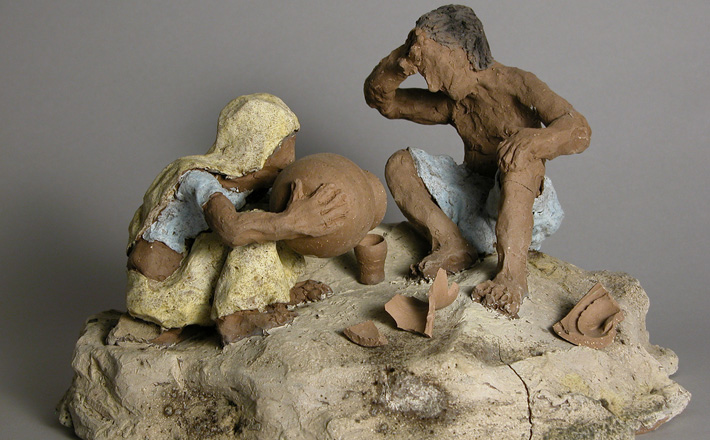Commentary on Isaiah 55:1-9
Chapter 55 serves as the conclusion to the section of Isaiah frequently dubbed “Deutero-Isaiah” (chapters 40-55).
This chapter must be read, understood, and considered in light of the beautiful, poetic language characteristic of this entire section. Within this collection, the nations are put to trial (chapter 41), idols are mocked (chapter 46), and the servant is called forth. But all of this must be heard in light of chapter 40 and the announcement of a new exodus back to Jerusalem where the “glory of the Lord shall be revealed and all people shall see it together” (40:5). Chapter 55 returns to the theme of a new exodus but with new themes articulated.
Within verses 1-3a, the author employs twelve imperatives — prompting, calling, and urging the faithful recognize the fullness of this moment and the fullness of God. In the ancient world, when a new king would assume the throne he would often issue a mišarum edict, declaring a release from all debts. As part of this edict, the king would also call for a great banquet to be enjoyed by the people of that kingdom. Both events, the edict and the banquet, signaled a new day under a new king. The opening lines of chapter 55 remind the hearer of such a banquet and more importantly, the signaling of a new day.
Verse 1 calls the people to the waters. No doubt, the reference to “waters” is meant to allude to the waters of Jerusalem, the fructifying waters of Zion, mentioned in other biblical texts (cf. Ezekiel 47: 1-12; Joel 3:18; Zechariah 14:1-11). The significance of these verses is not in what is served at this great banquet (wine, milk, bread and rich food), but the fact that it is the provision of Yahweh for thirsty people (cf. Psalm 42).
Do these verses refer to material provision or spiritual provision? The answer seems to be “yes.” Earlier in Isaiah (8:7; 12:15), the joy of Israel is said to be eating and drinking before the Lord — basking in the fullness of God. Obviously the first two verses have a metaphorical thrust, but in some ways, the metaphor functions as a double entendre, reminding them of the joy of eating and drinking in the presence of God.
The call for them to “listen” to Yahweh in verse 2b suggests that more than just material provision is in view. The people are to listen to what Yahweh is about to say, suggesting that the word of Yahweh is indeed the “stuff” of life. Such a point is made even clearer in 3a: “Listen, so that you may live.” For a people who had drunk deeply from the waters of deportation, exile, and estrangement, this invitation to return to the waters of Zion signaled a new day.
The word of the LORD is announced to the people in verses 3b-5. In chapters 40-54, David or the Davidic line is not in view; the emphasis is on the future restoration of God’s people. In verse 3b, however, the author invokes the name of David, and even the everlasting covenant made with David, yet instead of announcing a coming king out of the line of David, the author makes a radical move. The everlasting covenant made with David (2 Samuel 7) is now transferred to the people. The covenant demands assumed by the Lord in 2 Samuel do not become a relic of antiquity, but they become newly activated within the lives of that generation. Just as David had been a witness, leader, and commander for the peoples, so too shall this new generation of servants (54:17) be. These servants will work with the Lord in creating a rightly ordered world — one expressly envisioned later in chapter 65.
Verses 6-7 call the people to repentance. Such a call may seem strangely placed in this chapter, but it signals again the openness of God for the future of his people. In verses 3b-5, the Lord has announced the plan for his people; verses 6-7 stand as an open invitation to those who desire to participate. Even for the wicked and the unrighteous, there is hope. If they return to him, he freely forgives. They too will be included in this work of God.
The statements of God given in verses 8-9 no doubt anticipate questions that may result from the word from the Lord. What happened to the Davidic line and the promises to them? How can the Davidic covenant be given to the servants? How can God allow the wicked and the unrighteous to be a part of this new work?
The response is found in the affirmation that God’s thoughts are not human thoughts, nor are human ways God’s ways. Such verses are often taken out of context and applied to a myriad of circumstances, but here the meaning is rather straightforward. What may appear altogether unlikely may in fact be the faithfulness of God to his own plans and purposes.
The themes in Isaiah reflect the overall thrust of Lent. In some sense, Lent is an invitation to thirst. Those who truly thirst and who truly hunger for God and the ways of God (Matthew 5) understand this invitation. The invitation, though, is to do more than simply drink from the waters (verse 1), but it is to participate in the work of God. It is a work directed at more than simply the interior life, but a work that begins in the interior and has implications for all of God’s world (verse 5).
Lent calls us to “seek the Lord” and to “call upon him” (verse 6). Lent is an invitation and a reminder that this surprising work of God is open to us all — wicked and unrighteous alike — if we will return to the God who abundantly pardons.


March 7, 2010